Artist Miho Hatori performs at the Mishkin Gallery
October 22, 2022
Musician and artist Miho Hatori performed her commissioned audio-visual piece titled “Do Whales Dream of Electric Human?” This piece was included in the exhibition “Who Speaks for the Oceans?” at the Mishkin Gallery at Baruch College on Oct. 13.
The featured multimedia art pieces in the gallery were co-curated by Mishkin Gallery director Alaina Claire Feldman and professor of Biology and Environmental Sciences David Gruber.
Hatori is a Japanese singer-songwriter known for performing solo, co-founding the NYC band Cibo Matto and notably being the first voice of Noodle in the digital band Gorillaz.
Her installation poses the question, “What does it feel like to swim alongside a whale?”
“Do Whales Dream of Electric Human?” includes the mixing of various recordings of whale vocalizations that were inspired by Roger Payne, Philip K. Dick and her personal experience of offshore freediving. Japanese Ondo whaling hymns can be heard in the composition of this auditory art piece alongside spoken poetic verses and layers of sounds to further portray this feeling of being amongst these creatures.
“Whales might be a very interesting creature to play with in the music as well,” Hatori said. She created the piece because the diversity of whale sounds reminded her of a song. To be amongst a whale through this sonic performance as a listener can spark an understanding of marine life and create more awareness beyond our own humane environment.
Baruch graduate and announcer of Hatori’s live performance Barkat Chowdury spoke about his perspective on environmentalist artistic expression, as well as the importance of this piece in particular.
“I got excited actually because my final project was about music and how different songs and different sounds can be used to create a sort of playlist to help promote ocean conservation and get more in touch with the ocean, so I guess it just lined up that way but it was great to speak to Miho and learn about her creative processes,” Chowdury said.
The live performance ran for 30 minutes, accompanying Hatori’s live vocals and audio mixing were various visual clips that loop through a projection. Audience members are able to go through the multiple phases of the artwork, and are encouraged by the artist to interpret the sounds as they please.
“It’s the audience’s freedom on what they feel,” Hatori said.
The artist emphasized that listeners may have their own view or feeling towards her work, and there is no intention behind what feeling “Do Whales Dream of Electric Human?” should evoke, but rather it is meant to be a free and personal observation.
“Miho Hatori’s performance was a feast for the senses, both the twinkling lights and deep music radiating off the gallery’s walls caused the audience to ask themselves what do whales hear and what is their music,” Angelina Medina, who attended the performace, said.
Hatori has also worked on similar projects focused on marine life and conservation, including a charity campaign for EarthPercent, which allows the music industry to get involved with notable organizations that deal with Earth’s ongoing climate emergency.
The project is called “Marine Series” and is in collaboration with marine videographer Hassan Ali Khan, this piece was released in April. For each track sold, £1.30 went to EarthPercent’s grantmaking program with a means to raise awareness for environmental issues through performance art.
“Marine Series Vol.1–Mobula phantasmagoria,” provides a hybrid between sound and video to tell a story, displaying marine life in a fresh light that allows for a new outlook on these animals through the music they create with their natural sounds, similarly to Hatori’s current work at the Mishkin Gallery.
“Who Speaks for the Oceans?” will be running until Dec. 9 with Hatori’s video installation “Do Whales Dream of Electric Human?” on display for the public.
The Mishkin Gallery will be showcasing more performances and programs from contributing artists in the next coming months including “Holy Water, in discussion with Mami Wata” by Josèfa Ntjam on Nov. 3, an artist talk on Zoom titled ‘Ant Farm’s Dolphin Embassy’ on Nov. 17 and a collaborative performance titled Alvin Lucier’s Vespers on Dec. 1.







